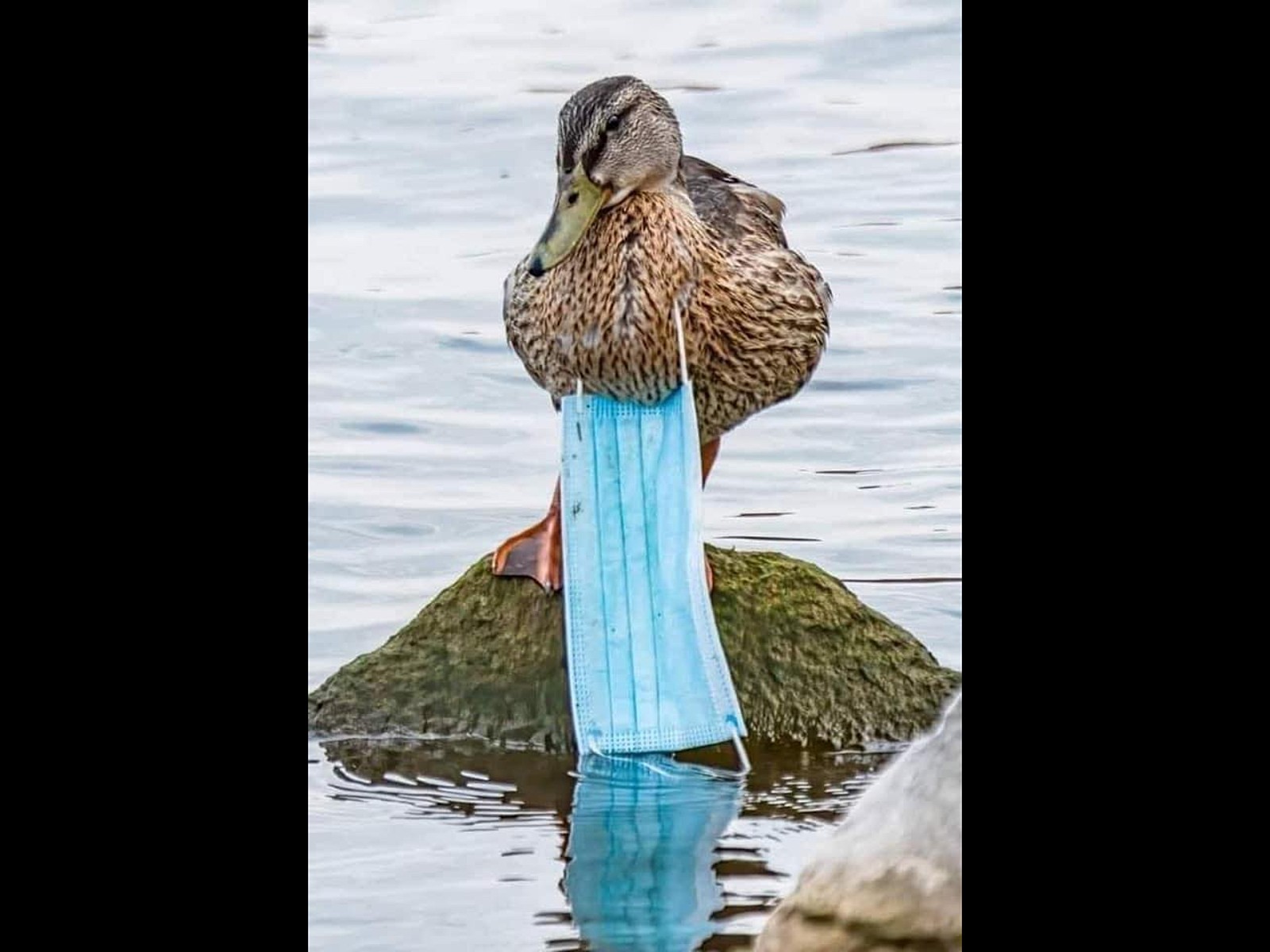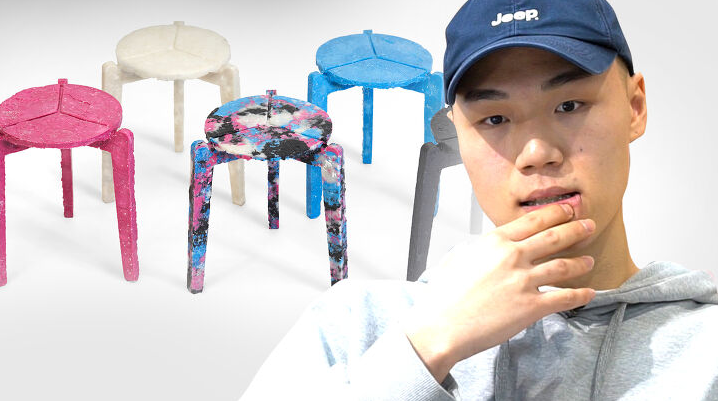You may have seen the pictures of wild animals on various beaches entangled in used face masks. Lots of birds have died with the disposable masks wrapped around their beaks, legs, necks, and wings. Face mask trash is so abundant around the globe, they are having a great impact on nature, causing severe problems for wild animals. A marine environmental organization in Hong Kong estimates that more than 1.56 billion waste masks flowed into the sea last year alone. Those who are alert to this situation may recycle the masks according to their own know-how, such as making hair ties using rubber bands from the masks or turning them into a mop. As the problem persists, more and more people are finding creative ways to recycle used face masks.
 |
| ▲ A duck is found with a face mask wrapped around its neck in its habitat. It does not seem to know how to remove the mask that is bothering it. (Photo from Mary Caporal Prior) |
A French start-up company, Plaxtil, developed a new recycling technique that converts mask waste into plastic. Masks are made of a plastic infused fabric so when we bury them in the ground, this can cause serious environmental pollution. Therefore, Plaxtil which developed a technology to recycle clothes made of synthetic fibers into plastic, utilizes this same technique to recycle used masks. "It isn't exactly the same as plastics produced in oil refineries, but it's strong enough to be used in almost any application that it has replaced conventional plastics," said Oliver Civil, the co-founder of Plaxtil. Also, researchers at the Royal Melbourne Institute of Technology in Australia are combining used masks pellets with building debris to process them into road-packing materials. Their study shows that using face masks to make just one kilometer of a two-lane road would use about 3 million masks, preventing 93 tons of waste from entering landfills. Minimizing the amount of waste generated by Covid-19, is a good example of a circular economy that aims to reduce waste and pollution.
In Korea, masks that are not likely to be contaminated are being recycled through an 'up-cycling (re-processed without dismantling raw materials) method or by a 'down-cycling (re-processed in other forms through mechanical and chemical processes) method. Treeplanet, a social innovation company, is making ‘SMIM Flower Pot’ using face mask fabric and transparent plastic bottles. The pots have the ability to help plants absorb water when they need it. This is an example of the upcycling of used face masks. There are also cases where used masks are down-cycled. Kim Ha-neul, a student majoring in Living Design Department at Kaywon University of Arts, made chairs out of used face masks. He melted the masks at high temperatures and then hardened them into the shape of the chair. Furthermore, students from Yonsei University’s club ‘Mask Do It’ collected waste masks from schools and the National Health Insurance Corporation to make quarantine supplies. They dissolved the masks after sterilizing them and made them into plastic material. They produced a quarantine product called ‘Touch Free Key’ that allows users to press buttons in elevators or public places without touching them directly.
 |
| ▲ Kim Ha-neul, a student majoring in Living Design Department at Kaywon University of Arts, and his chairs made out of used face masks. (Photo from SBS News) |
According to the Ministry of Food and Drug Safety, Korea produced 6.5 billion face masks last year alone. Since the average weight of one mask is 4g, we could say at least 24,000 tons of mask waste has been generated. However, the Ministry of Environment issued a guideline earlier last year stating recycled masks are not safe from the coronavirus. As masks are usually thrown away with regular waste, people can be infected in the process of separating and collecting them. Also, a face mask is a mixture of three components, including rubber bands, nose supports, and mask faces. This means there also are high risks of infection during the recycling processes. For these reasons, the government is having a hard time responding to the recycling of used face masks. Mr. Kim was recycling face masks to make his chairs, but is currently making them out of fabrics that are thrown away by factories, because of the pathological risks.
The purpose of wearing masks before Covid-19 was usually to avoid yellow dust, and fine dust or to prevent respiratory diseases, and infections in vulnerable people. However, approximately 129 billion masks a month are currently being thrown away around the world and it is becoming a significant new form of environmental pollution. So, masks will have to be properly dumped into trash cans. Even if masks are completely separated, there remains several problems that arise while incinerating or burying them, so it is critical to find a way to minimize the risk of infection during the mask collection process and to find the best sterilizing methods for their recycled use.
The coronavirus vaccination will not have an impact on the number of masks we use in 2021 due to the problem of securing immunity. Therefore, we should keep seeking ways to recycle used face masks safely and continue to promote the development of mask recycling technology that keeps our landfills from overflowing and our wildlife from suffering.
박지안, 정예지, 김건희 dankookherald@gmail.com

![[Campus Magnifier] Let's Surf the Library!](/news/photo/202404/12496_1765_4143.jpg) [Campus Magnifier] Let's Surf the Library!
[Campus Magnifier] Let's Surf the Library!
![[Campus Magnifier] Let's Surf the Library!](/news/thumbnail/202404/12496_1765_4143_v150.jpg)





